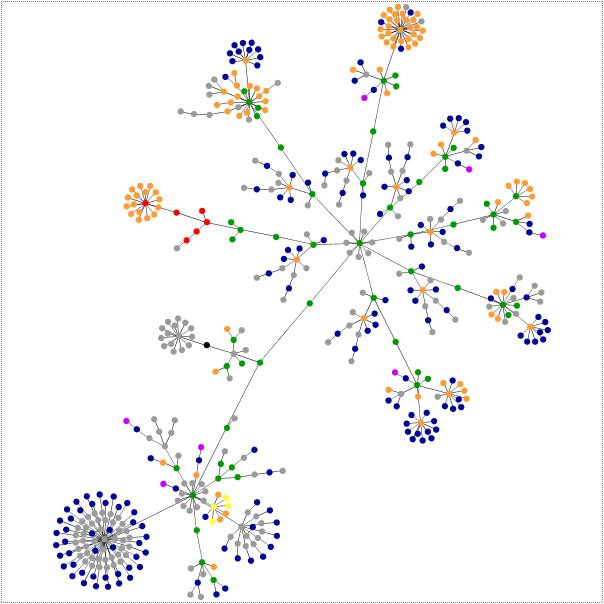Notes Towards Day 7: Bringing it Together
A Day of Linking:
Bringing Ideas into Relation to One Another
(or: Laura’s “utopia”)
“consumer-protection bioethics…talks about…cost and safety….Socratic bioethics calls attention to connections…between practices…and people, breaking down the idea that any decision can be strictly individual” (from “Surgically Shaping Children”)
Cf. Laura’s network graph
(representing connections between things)
with Colleen Canavan’s
“Exploring Cosmetic Surgery in the Social Sciences“:
cfing concept relationships in psychology w/ those in sociology
I. Intros: Hillary, Farhat, Hannah, and….?
(Monday’s intros tba)
II. Techno-convo
I. Intros: Hillary, Farhat, Hannah, and….?
(Monday’s intros tba)
II. Techno-convo
-
Tinkering by Laura (aka “Word Press Goddess”)
has led us to
–a gravitar account that will display your
(real? fake?) photo w/ your comments–a related posts feature that now
shows up on each ind’l posting
-
urge you to post more comments
(or posts, as conversation/in response)?Surprised so few questions for Ryan and Alex;
(or follow-up musings abt. their visit);
lotsa book reports/accounts of reading,
instead of talking to them, w/ one another?Cf. Historiann’s “thanks for the link–I’m a Bryn Mawr graduate myself (1990), so it’s fun to hear about people [that would be Guinevere] at my old college reading my blog.”
II. Where we are now:
finishing first unit of the course, on
Technologies of Gender: Making and Re-Making Ourselves
today’s project is to review what we know/don’t
papers due Friday @ 5:
what do you need to know about that process?
technically?
conceptually?
make it abt. a real question that you can get
concrete, specific data to answer; &
frame it w/ the course readings/discussing
(no meteors, please!)
be sure to make a parent page for this “child” of yours
we’ll be commenting publicly on your papers–
deliberative extension of our commitment to “thinking outloud/
being public intellectuals” (problematics of this process…)
III. On Wednesday, begin next unit, on
Engendering Technology: How Have We Used (“Made”) Machines?
very different format for next three weeks (until break)
–a series of panel discussions (1/3 class, 13 each; 2x)
–first 3 about individually gendered use of technology
–followed by 3 more panels about
collectively gendered uses of technology
BESIDES POSTING YOUR PAPER on Friday evening,
report to Panel Sign-Ups and indicate WHO YOU WILL REPRESENT
(one sentence describing them w/ a few relevant FAQs);
(next weekend, post on
WHAT GROUP EXPERIENCE YOU WILL BE TALKING ABOUT)
if we are to set up the groups w/ some
coherence/logic (based on your topics),
you have to meet the deadline!
we’ll let you know on Saturday
which group you’re in; no choices
1/3 of you will be “on” on Monday
Laura and I will moderate the panels;
we’ll have questions for you, get you to talk w/ one another
for this first series, you need to come to class ready to
perform the identity of someone whose life (you think)
represents an interesting/instructive intersection
of gender and technology
first group will be all first person–
“literary”– testimony(from the inside…) ;
second series more anthropological/sociological (from the outside);
problematic distinction, since all experience is shared;
also problematic to “represent” another
(Spivak, “Can the Subaltern Speak?”;
cf. Stone, “How can the transsexual speak?”
& js’s very sharp critiques of narrating subjectivity)
but: try it out….
on the readings page you’ll see a “starter” bibliography:
texts I turned up in my reading marathon this summer,
about Jerrie Cobb, Amelia Earhart, Grace Hopper,
Sally Ride, Gertrude Stein, Alan Turing
plus Hannah’s article abt. female genital surgeries,
Melanie’s on vaginal reconstructive surgery,
George’s about extreme body modification;
several other about female suicide bombers in Iraq
not the least bit exhaustive;
point here is to identify someone
whose life you’d like to know more about,
that you think will help all of us in knowing/ thinking more
about the ways in which technology has, historically, been gendered
could certainly select any of the theorists
whose work we’ve been reading,
or others (Judy Butler, Kate Bornstein, Susan Stryker)
whose work seems relevant to you/
who you’ve always wanted to know more about
(not someone you know about already!)
several of you have been posting about Barbie; research her creator;
others of you seem very interested in
varieties of queer/trans identities;
research, come ready to perform that
(only rule: cannot be yourself–>
think yourself into someone else’s life…)
 Facilities Services
Facilities Services
another possibility would be to interview some/several ones
(Doug, Deepak, Dianna in computer science here;
others in Art History, Education, Physics,
Geology, GIS (Betsy Reese?) or Facilities–>
“six HVAC mechanics, three electricians, two plumbers, three carpenters and one locksmith. The leaders of these groups are masters in their trades.”
what do you know about the technologies of running this place?
how gendered is it? how marked by gender?
happy to make suggestions,
if you want to talk to a certain “sort” of person on campus;
happy to consult electronically
(before Friday night) about possibilities
(interviews come last)
|
|
|
but hope, too, we won’t succomb to “presentism”–>
get some history in here!
also ALERT!: not about reading 1 Wikipedia article,
or having a 1/2-hour chat;
we expect several hours of research=
all your course prep for next 3 classes;
could also be research for your next paper….
QUESTIONS?
IV. On Monday, we met w/ Alex Tisman and Ryan Brazzel;
you read essays by Bernice Housman and Sandy Stone
 |
 |
For today, we asked you to
spend some time on web/watching video:
My Right Self (anyone go to the event @ Swat?)
“Pregnant Men”/Transparent /Stanford site re:
“Promoting the Ethical Use of Technology
to Expand Human Capabilities”
Natahsa pulled out from My Right Self the idea of
DNA as a “technology” that inscribes itself on us
rather than work our way through that material directly,
want to prod us now into some kind of summative conversation
write for 10 minutes abt. all of these questions:
then write on the board answers to three of them
want to prod us now into some kind of summative conversation
then write on the board answers to three of them
1) how would you (now) define gender? 2) & technology
3) how do you understand the relation between them?
4) what do you know (=what you’ve gotten)?
5) what do you not know/want to know
(=what questions do you have?)
6) also any relevant feedback re: what’s working/
what’s not working (font size, etc!)
V. let’s focus on our questions
(useful exercise for your papers….
what do you want to know more about?)
VI. My reading notes/questions
IEET’s “technoprogressive” orientation to
“human enhancement technologies,” in
debate with the “bioconservative” coalition,
positions itself between “technophobes” and
“anti-regulatory technophiles” (aka “libertarian transhumanists”).
Defending rights and taking risks seriously, they ask,
–“Which enhancement therapies should be provided through the market and which as a right of citizenship through universal health plans?”
—What limits should be set to a
“generalized right to technological empowerment”?
—Might enhancements inspire such an unprecedented diversity of human beings that they strain the limits of liberal tolerance and social solidarity?
Susan Stryker on self-demand amputation:
We argue that “integrity” is not predicated on notions of natural, biological, organic units, but rather on the availability of the body for integration as a source of biopower into the State’s project…a radically antihumanist understanding of the political struggles that structure the occupation of one’s own embodied space, which ultimately determines whether the body is available as a resource for subjective ends as well as state functions.
????
“generalized right to technological empowerment”?
We argue that “integrity” is not predicated on notions of natural, biological, organic units, but rather on the availability of the body for integration as a source of biopower into the State’s project…a radically antihumanist understanding of the political struggles that structure the occupation of one’s own embodied space, which ultimately determines whether the body is available as a resource for subjective ends as well as state functions.





